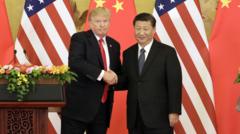The US and China are on the brink of diplomatic engagement as they prepare for crucial trade talks this Saturday in Switzerland. This meeting represents the first high-level dialogue between the two nations since the implementation of aggressive tariffs by US President Donald Trump in January, which were met with immediate retaliation from Beijing. Currently, Chinese imports into the US bear tariffs of 145%, while some US goods face duties as high as 125% in China.
Despite the lengthy exchange of sharp rhetoric where each side accused the other of desperation, the tone has shifted towards negotiation, sparking questions about why talks are resuming now. Analysts note that both countries appear to have assessed that they can pursue dialogue without appearing weak. "Neither side wants to appear to back down," remarked Stephen Olson, a senior fellow at Singapore's ISEAS-Yusof Ishak Institute and former US trade negotiator, highlighting the delicate balance at play.
Chinese officials, however, assert that these talks are initiated due to pressure from US businesses and consumers, with China’s foreign ministry stating that they're responding to calls from Washington. Contrarily, Trump maintains that it is China that desires to resume trade talks, spurred by pressures from an ailing Chinese economy. "Their economy is collapsing," he remarked, dismissing claims that the US initiated the discussions.
The timing of these negotiations coincides critically with President Xi Jinping's visit to Moscow, reinforcing China’s diplomatic outreach beyond the US and signaling its standing on the global stage. The continuous tariffs have inflicted economic pain on both sides, with China's manufacturing output plummeting to its lowest levels since late 2023. This economic downturn has compelled Beijing to reassess its stance, prompting a willingness to engage in talks, as noted by Bert Hofman, a professor at Singapore's East Asian Institute.
Moreover, the uncertainty surrounding the tariffs has contributed to a contraction in the US economy, marking the first decline in three years. American businesses tied to Chinese imports are increasingly alarmed about the ramifications for their supply chains. Despite potential benefits of a trade agreement, experts caution that an immediate solution is unlikely. Instead, these talks may serve as an initial step to establish further discussions and set the groundwork for future agreements.
Given the nuances in both nations' economic landscapes, there is optimism surrounding the dialogues, although tangible outcomes may require significant time to materialize. As both countries face mounting pressures—be it from the markets or domestic audiences—these upcoming talks may provide a necessary reprieve, yet the underlying issues in the US-China trade relationship remain challenging and complex.





















